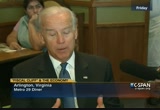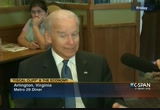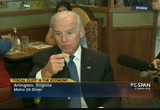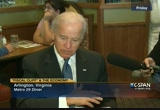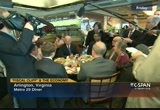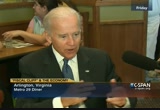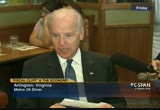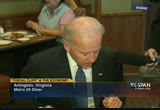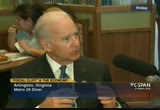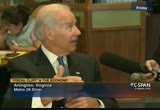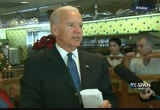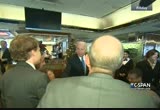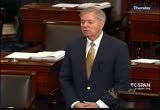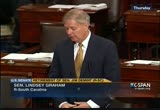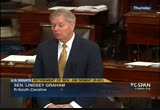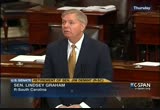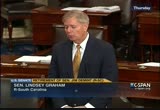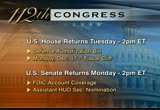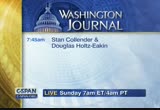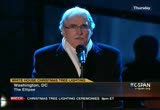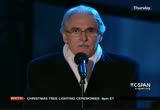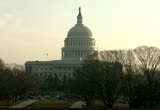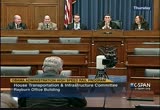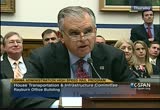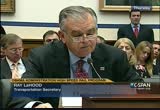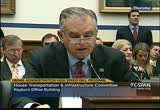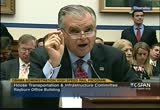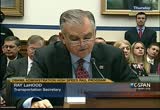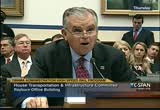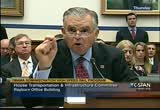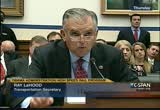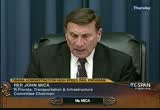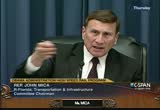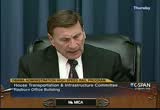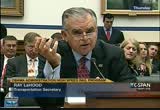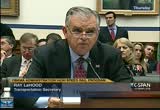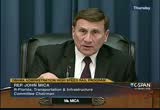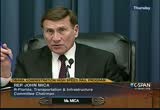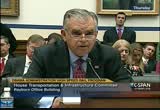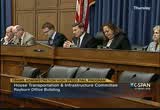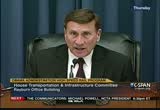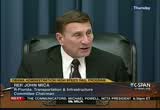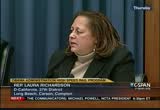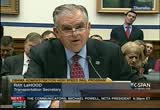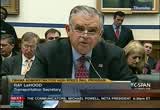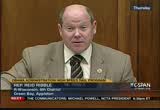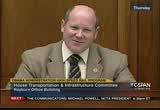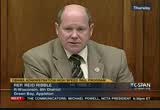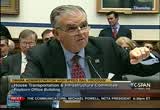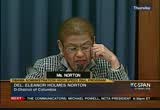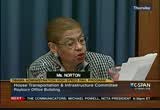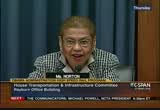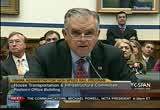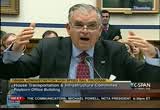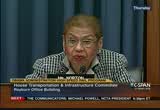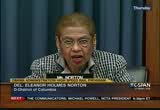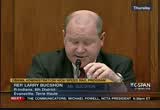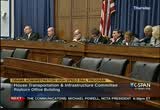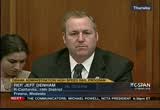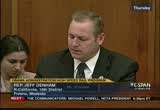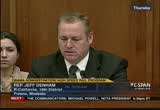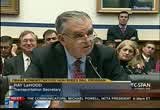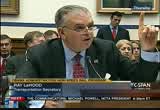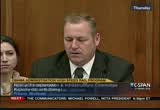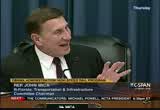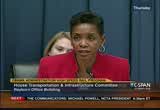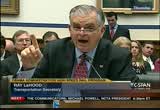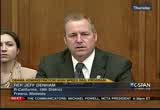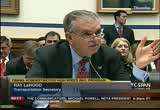tv News Politics and Public Affairs CSPAN December 8, 2012 3:35pm-5:00pm EST
3:35 pm
those just to be able to help finance a used car to enable your sister to be able to get to work, a woman in her 60s who is on her own. with problems related to her health. just the physical ability to get there. i don't know why the guys we work with do not get it makes a difference, like whether or not you can finance a new car. $3,000 makes a difference. or whether your kids can save enough for college, or this young man whose family fell on some hard times for a while and medicaid was needed. now he is graduating from a great university here in the metropolitan area and figuring out how he is going to pay off his tuition. he is going to graduate like the
3:36 pm
average guy with $30,000 in debt. my first house cost less than that. i am very old now and then these things or in a situation when we were talking to bob -- excuse me, not bob. your first name, david. david, by the way -- he is even older than i am. i want to know what he is eating for lunch so i can have the same thing. david is retired and in good shape. he has a son who needs physical assistance with prescriptions and medical costs. it makes a difference. a grown son who still needs help. you take away a couple thousand dollars out of your pocket next year, it matters. it is about $270 a month.
3:37 pm
that is real money. look, the thing that the folks around this table represent -- every one of these people are hard-working people. what impressed me most about them was they are even more worried about people who are poor, more worried about people who are out there struggling to put 1 foot in front of the other. we focused on wha tthe tax increase would mean to them. but it would also mean a great deal to the economy as well. it is estimated that this tax cut for the middle-class, if not passed, there will be $200 billion taken out of the economy next year. that will determine how many waitresses are working here, how many people -- how many sales
3:38 pm
persons there are when you see if you can help your sister with her car at. that will determine whether or not you have a job when you graduate. it is going to make a difference to your kids. they are struggling, working hard on their own. whether your son can go back and get his master's or save what he can to get back. that is going to affect economic growth. what we have going now -- there can be no debate. some of my very conservative friends continue to try to reject it is awful hard for them to accept compromise. the economy is beginning -- continuing to move. having met with all the stakeholders, we have met with a number of ceo's, a number of
3:39 pm
companies and small business people, labor community, progressive groups. the interesting thing that the business folks are telling us about is the downside of going off this steep slope is real. it is going to curtail growth. but the upside is even bigger than the downside. they are ready to move. they have well over a trillion dollars out there to invest if they think the economy is going to move. so, i just want to thank these folks for giving me the time, and quite frankly being so open about their personal circumstances because that is not easy. to be peoplable to sit here andi have a developmentally disabled son. it is not easy to do.
3:40 pm
i thank them very, very much. them that i warned you may or may not ask them questions. i will let you make those individual arrangement. if they are comfortable with it. these are hard-working, serious and americans who have been playing by the rules and are doing all right, struggling already in this economy. if the end result is they get hit with another burden, which is a new tax increase, every one of them point out -- four of them have pointed out -- a lot of folks are wealthy people. they are just as patriotic as
3:41 pm
middle-class folks. we do not know many people who we know that are really doing well who are not willing to pay more, to pay their fair share. this is no time to add any additional burden on middle- class people. folks, this is not hard. this ain't rocket science. it would take 15 minutes from the time the decision is made by the speaker of the house to pass and make permanent middle- class tax cuts. the president would probably have me sprint up the hill to bring the bill back down to be signed. it is not complicated. it is not complicated. it does not even require a republican friends to say we agree that we should raise taxes on the top 2%.
3:42 pm
all its says is decoupled. let us take care of business and let us vote on the others, but do not hold hostage the relief for the middle class because you insist that 120,000 families get a $500 billion tax cut over 10 years. i have no idea the party affiliations. i expect a democrat over here. [laughter] beyond that, i am not going to guess. anyway, thank you, guys, very much. we have taken care of your lunch. this is a big deal. this i can afford. thank you very much for taking the time.
3:43 pm
we are prepared and the president has made a clear and the secretary geithner has made it clear, there are two requirements. one, the top brackets have to go up. this is not a negotiable issue. we think it should go to 39.6%. again, every major corporate leader who is in that bracket said we have no problem. not a single one. from republicans see those to those few who might be democrat, not one sat in the roosevelt room and said we cannot afford that. they thought it should be done. we have to have a mechanism to stop the brinksmanship on dealing with the national debt. it is putting us in a place
3:44 pm
where the idea that a couple times a year be in a position to hold hostage of the full faith and credit of the united states and the say we are not going to meet our national obligations. it is not acceptable. the thing that is different this time is i think the vast majority of the american people have figured out, they know when you start playing games with the debt ceiling, america's credit rating is reduced and that has consequences in economic growth. we are not going to play this game with brinksmanship every six months. those are the two things that are minimally required at. we are prepared to sit down and listen to alternatives they have on entitlements. we are prepared. we do not think there is much
3:45 pm
room but we are prepared to look at the discretionary budget. but we think we need a package where the revenue is in the range of $1.70 trillion over 10 years. >> [inaudible] >> well, i will let the american people make their judgment about whether or not they think that is the case. we have laid out where we are. there has been a referendum on the two points i have made already. i think every serious economist i have spoken to knows there has to be revenue. you have to do something about rates. all of a sudden going into health care in terms of employment or fooling around with mortgage deductions, you
3:46 pm
cannot get there without the rates being affected. they know it. look, i am -- person i negotiate every day is with the president. we discussed this every day with the team. i am not a negotiator. our point person on this, you know the team. the president is ready to respond on any serious offer on the table. you have to include the top rate. i am an optimist genetically. i am. i am encouraged. not the monthly job numbers, but i am encouraged because i think we have turned the corner as an economy. the trajectory is and the right direction. we can argue about whether or
3:47 pm
not the impact of sandy was or was not calculated. it is an undeniable the trajectory is positive. the one thing i think everyone you will speak to i believe is that there is a sense that if we can reach and act like adults and reach an agreement here on the fiscal cliff, the upside is much higher even than the downside is if we don't. that is what we should be looking forward to. we should do that now. think of how many people out there making a judgment of whether or not they will spend another $300 on christmas gifts if they think next month they are going to have $260 less in their paycheck. thank you all very much.
3:48 pm
thank you all. good luck to you. good luck. thank you. than kyou k you. [captioning performed by national captioning institute] [captions copyright national cable satellite corp. 2012] >> this past thursday, south carolina and senator jim demint announced he is retiring from the senate. his colleague and fellow south carolina senator lindsey graham pay him tribute on the senate floor. >> madam president, i met with jim demint this morning. to say i was stunned is an understatement. jim indicated to me that he will be retiring from the senate next year and taking over the presidency of the heritage foundation, one of the great conservative think-tanks here in washington. my reaction for the people of so my reaction for the people of south carolina is -- you have lost a great, strong conservative voice, someone who
3:49 pm
has championed the conservative cause and represented our state with distinction, sincerity, and a great deal of passion. on a personal level, i've lost my colleague and friend. jim and i've known each other for almost 20 years now and i think we've done a pretty darned good job for south carolina. at times playing the good cop, the bad cop, but always -- always trying to work together. and what differences we've had have been sincere, and that's the word i would use about senator demint. he sincerely believes in his cause. he's a - he sincerely believes in his causes. he's a sincere voice that people in our party look to for leadership and guidance. what he's done over the last four years to build a conservative movement, to get people involved in politics, like marco rubio, who jim helped early on in his primary i just think is going to be a great legacy. from a state point of view, we have lost one of our great champions. but he and debbie, jim and debbie have raised four wonderful children. they got great grandkids, and i
3:50 pm
knowim is looking forward to staying involved in pushing the conservative cause outside the body. he was an effective voice in the senate, whether you agreed with jim or not. he really did strongly and passionately advocate for his positions and did it very effectively. jim made the republican party, quite frankly, look inward and do some self-evaluation. conservatism is an asset, not a liability, as we try to govern this country in the 21st century. and i look forward to staying in touch with jim and to working with him at the heritage foundation to see what we can do to improve the fate of our country so we will not become greece. no one is more worried about this nation's unsustainable debt situation than senator demint. i've seen him deinvolve over time to someone who could just not sit quietly, who had to take up the cause. in the 2010 election cycle, he
3:51 pm
was one of the strongest voices is he h would a lost our way that we'd lost our way in washington. jim is a kind, sincere man, an individual who is a joy to be around. when it comes to what's going on america, jim undstands that if we don't make some changes we're going to lose our way of life. that's what's driven him above all else, to try to keep our country a place to be place where you can be anything. i look forward to working with jim in the private sector. from a personal point of view, we've had a great ride together. it has been fun. it has been challenging, and i think we put south carolina on the map in different ways at different times, and to people back in south carolina, i hope if you get to see jim anytime
3:52 pm
soon, just say "thank you." because whether you agree with him or not, he was doing wt he thought was best for south carolina and the united states. at the end of the day, that's as good as it gets. because if you're doing what you really believe in and you're not worried about being the most popular and people getting mad ought, then you can really do a good job in washington. to the people back in south carolina, everything jim has tried to do has been motivated about the changing the country. if you get a chance to run into him anytime soon in the coming day, please just say "thank you" because heid his job as he saw fit. he did what he thought was best and he didn't worry about being the most popular or taking on people when he thought he was right. i can tell you this, when it comes to me, he has always been a friend, somebody i could count on.
3:53 pm
3:54 pm
the house returns on tuesday at 2:00 p.m. eastern and will be appointing members to a carbons committee to work on an agreement with the senate on defense programs next year. eric cantor says the house will be in session monday, december 17 to deal with the fiscal cliff. live coverage of the house here on c-span. the senate returns on monday at 2:00 p.m. eastern to consideration of a bill that would extend the fdic transaction guarantee program that provides unlimited deposit coverage for non-interest bearing account. the senate will consider the nomination of the assistant secretary of housing and urban development. tomorrow, we will talk about the latest news about the so-called fiscal cliff negotiations with a former congressional budget
3:55 pm
office director. then a look at the lobbying going on in washington. later, a look at developments in syria and the response from the international community. "washington journal" here on c- span. this week, we will have the vermont governor and new chairman of the democratic governors' association, who will talk about the fiscal cliff and laying the groundwork for the 2013 and 2014 elections. lives on sunday at 10:00 a.m. eastern. next, a quick look at president obama and the first family last week at the national christmas tree lighting ceremony. ♪
3:56 pm
3:57 pm
3:58 pm
prayer. let us prey. gracious god who has blessed us with this good land for our heritage, we humbly pray that we may always prove ourselves to be a people mindful of your favre and glad to do your will. we pray that you will save us from violence and confusion, from pride, arrogant, and fear of each other. defend our liberties and fashioned into one united people of the multitude brought here from many nations and languages. those inthat you shower u our government that we may be a blessing to all of the nations of the world. in a time of prosperity, fill our hearts with think on this,
3:59 pm
and in days of trouble, let us not lose our trust in you. let this be a reminder that you are connected to us in relationship with us, standing with us at all times. all this we ask in your name, amen. [captioning performed by national captioning institute] [captions copyright national cable satellite corp. 2012] >> the christmas trees were lit in washington, d.c., this week. a tradition that began with president calvin coolidge and house speaker john boehner joined the lighting of the capitol christmas treat. this year's christmas tree is from the colorado river white forest. we will show both of those ceremonies right here on c-span. up next, the transportation secretary on the high-speed rail program. more than $10 billion has been appropriated to provide greater access to high-speed rail.
4:00 pm
this hearing to examine the management of the program, our second panel, former member of this panel, distinguished secretary of transportation who we have had a chance to work with. we appreciate his being here and on the anniversary of his birth. welcome. you are recognized. >> let me begin by congratulating you. a job well done. when i came here with the chair and i heard all of dimon's
4:01 pm
lectures,--- jim's what you have been able to accomplish as chair of the committee is extraordinary. it is a good bill. an faa bill. it is a good bill. we cannot do the work we do without the relationship of this committee and your chairmanship over the last time that we have been together. you have done a lot. you have a lot to be proud of. we have not agreed on everything but we have agreed on most things. we agree how important transportation is for america. i want to offer my words of congratulations to you. i want to say as a former his teamif jiand jim and
4:02 pm
did a really good job. i know he is moving on to bigger and better things. to all of the staff at work on this committee, you are the ones that do the work. we appreciate all of you also. to the chairman and the ranking member, i am delighted to be here. president obama's rail program is being more options to millions of americans as we invest in our rails for creating jobs and supporting economic growth. it is critical to america's future. by 2015 our country will be home to 100 million more people. right now our highways and runways are already congested. i do not have to tell any of you that. this congestion will only grow with time.
4:03 pm
we can act today or face a transportation crisis later. investing in real is a priority. it is high priority of the american people. you acknowledged to our three governors that turned down the money. during this time we have received 500 applications for the money that was turned back in florida, $2.3 billion. we have $10 billion worth of requests. the idea that people do not want passenger rail? they do. we have the statistics. we have the people that tell us this. thus a get the progress. as a result of this
4:04 pm
administration's investment, the first high-speed rail system is set to take place. it will carry travelers from los angeles in san francisco in less than three hours, morris twice as fast by interstate. -- nearly twice as fast by interstate. california will have to high- speed trains. we are expanding 110 miles per hour service. that is high-speed train. in october i wrote on a train for a very short stretch. i saw the progress myself. i recently visited a plant that is building 130 rail cars increasing about 250 jobs in the process. these are cars being ordered from california and other places.
4:05 pm
these are american jobs. american workers building america's train sets. that is what this is about. this plant and not exist before president obama initiated a high-speed rail program. -- this plan that did not exist before president obama initiated a high-speed rail program. when i was there that day, they are talking about building another facility there as a result this is lustration has for rail. it is not just the future. these eight jobs exist today as a result of our investments. there strengthening the connections between regions and revitalizing -- they are strengthening the connections between regions in revitalizing. we're trying to determine the next corridor of service. in a short amount of time we have developed sophisticated
4:06 pm
grit management processes for the largest discretionary infrastructure programs in the country. rather than a one size fits all approach for targeting service improvements for those of you who think we have not moved fast enough, four years ago there was no high speed real vision. four years ago when not invested $10 billion. if we would have moved too fast and the money had not been spent or allocated, i would be answering your questions about that. we had to reach agreements with countries in america. i hope you're going to hear from the head of the freight rail system that we were cooperating with every freight rail. we worked with them.
4:07 pm
for years. -- four years. we do not have enough money to build all the tracks. we need our friends and freight rail. the idea that it is taking too long, it took 50 years to build the interstate system. in the beginning not every governor wanted a road running through the state. because of the vision of eisenhower, because of the visit of a congress the set every year we will invest in highways, we have a state of the art interstate system. 99% of our total program funding. as a result 152 projects are
4:08 pm
moving forward. not fast enough for some but done enough the right way. we have $1.7 billion in construction. in four years, not fast enough for some but pretty darn good and done the right thing by the book. we have another $1.5 billion in job-creating projects that will create grounds in the next six months. we have seen them come in on time and on budget. we recently did one in vermont. we restored it since 1959. it's part millions of dollars in private investor investment. we have invested more than $3
4:09 pm
billion in projects. for those of you who think we have not invested enough, we have invested 3000 -- $3 million. that is as much in california appeared more than we invested anywhere else in the country. we are laying the foundation to expand and high-speed rail. our investment will ensure that by 2016 the segment between new haven and heartfelt will provide commuters more frequent, reliable train service. in pennsylvania we made improvements on the keystone quarter that will allow trains to travel at higher speeds as much as we have accomplished, with only started to make the enormous demand for passenger rail. or last eight years particularly younger americans have been driving less what using public
4:10 pm
transit. we are doing what previous generations did for us. we have an obligation to do what other generations and it appeared in the other generations about the interstate system. i have nine grandchildren. what are we going to do for the next generation? the next generation of high- speed rail. we are on track to accomplish it. we're not going to stop. we will not be dissuaded by our contractors. we are on our way. the president has a vision. many of you have a vision. it is going to happen. thank you. i am happy to answer questions. >> thank you. we will get right into questions. >> could i just also insert -- 9 >> without objection, your and the lr ement
4:11 pm
at will be made part of the record without objection. >> a couple of the concerns that we have, first of all, i mentioned before that out of $10 billion i think $8 billion was stimulus. another several billion appropriated by congress. only 7% have actually been spent. you have indicated, can you provide the committee with a time frame of the payout? you have asked for additional investment. they talked about putting more money in. we have difficulty getting money out. it can be obligated. 7% is 700 million. congress had even taken back
4:12 pm
some of the money that had been appropriated. shell already has been somewhat of a national joke. it -- shovel-ready has been somewhat of a national joke because everything takes so long. we tried to get and expediting of the process. i have agencies that are responsible for getting that money out. can you provide us with an expenditure graphic description? >> i will do that for the record it that is ok. >> i do not mind investing the money and we know how it is being spent. to come and ask for more and we have not been able to spend it, recommendations or speeding up the process. some of the things we do with fra are totally mindless.
4:13 pm
you can run all kinds of process. then we spend years doing these studies to see if we can run additional passenger service. >> look. i think you did some good work on speeding things up. some of that was compromise to get it through. particularly in real to get people out of their cars for energy for the environment. we have to be able to spend the money, 7%. 2.5 years after stimulus we only had $67 billion. 35% was still sitting in washington. we have to change the law.
4:14 pm
there's some things express and the government accountability report on the selection of some of these projects. their release this march of 2011. specifically at -- bay released this march of 2011. specifically they said there were concerns about transparency and other issues with it. they cannot verify some of the criteria by which some of these projects were selected. can you cite any improvement in that process? you were citing a number of projects but also criticized by gao for the process. >> we tried to improve our decision making process. we have tried to use the governors as our partners on these projects. receiving proposals from them
4:15 pm
and from the state's and working with them -- states and working with them. try to improve our process for selecting projects. >> the other most recent report by the inspector general, released just weeks ago, saidmber 11, 2000112, it they raised concerns about the management framework and the stakeholder agreement process. would you like to comment regarding their criticisms? >> when this program started it was part of the stimulus program. a billion dollars. we have never had a high-speed rail program before. we had to staff up. were we short of staff? yes.
4:16 pm
have we found people with the expertise of? ? yes. we have tried to make those improvements. on the day that this program started there was no high-speed rail program or staff. we had the staff up for that. >> we do only have one high- speed rail project under way in the united states. we have a long term plan. i think this can be done. probably 1/3 of the money as we included private sector partnership to people of actually build these systems in congested corridor. that is the subject of next week. most of the commentary, the one project we have that can achieve
4:17 pm
high speed chosen between two fairly rural destinations plan to connect into the major metropolitan areas, san francisco to the north, los angeles to the south. it may be true in three years or so we can finish that leg appeared the total cost is about $6 billion. -- that leg. the total cost is about $6 billion when we get through. in the report we have from california is that the total project is going to be $68 million with a completion date of 2028. the latest plan, that raises questions if it is $6 million or $8 million. that leaves $60 million. it would take a substantial
4:18 pm
federal commitment in the future. we have the next four years. we have 39% of the stimulus money obligated to the california project. along the return of commitment. -- a huge return of commitment. the other criticism i heard was that they are looking at they could save some money, but they're going to use current right of way to san francisco and los angeles. it is not a dedicated highs the alignment. the future federal support is estimated at $42 billion. how do you see that playing out? >> we have a very strong commitment from the governor who has appointed new people to his
4:19 pm
rail authority. governor brown is as committed a governor as we have in the country to this project. we also have a very committed assembly in california that had to take a vote to sell the bonds. both the house and senate voted for this project. you all know they represent the people in california. at the very top leadership in california, we have the people supporting this. we need to support it. we also have several companies talking with the governor and his staff and the high speed rail authority about investing in california. we know that this project cannot or will not be built with total federal dollars. we do not have enough money to do that. we need private investment. >> it appears that there is a
4:20 pm
commitment. the have already committed 39% of the $10 billion which should be sufficient from a federal standpoint for this first leg. the first leg is sorted the easy part of it. it does not serve metropolitan areas. in the expensive and more difficult part is down the road. that will take a commitment from future congresses and future state legislatures. it will not be fully completed high speed rail system in california until 2020 by their estimate. we are missing $42 billion in federal money and 60 something billion dollars for the total project. if there is some plan that the
4:21 pm
administration has for partnering in future, we would also like to see that. what about the issues raised now about the non-dedicated alignment using current right away is north and south -- right of ways north and south. >> there are lots of private investigators working with the state of california and others about their ability to privately invest in this project. we know fully well this project will not be fully funded by the federal government. california knows that. i will have to some is something for the record on those alignments. >> it sounds appear open to having the private sector in that corridor.
4:22 pm
i met recently with some of the high-speed various countries to have their operations. we are falling further behind. even the russians had something at the table. i was interested to find the european union is not open. all of the public transportation operations for high-speed and other rail service to the private sector, which is something we should let, and italy has more forward in an expedited fashion open to a private contractor who is now providing competing service to
4:23 pm
the public sector in italy so we can look at some things that may not be successful in other countries and tried to pick the very best options. let me yield mel. >> thank you. i can only take my colleagues at his word. when we went to the central valley, one of the robot has been the lack of knowing the details. the conversation you just went through with mr. lahood, how could we expect to get an update on who these private companies are that are able to invest that come much are they willing to invest that i have heard him say
4:24 pm
the same concern for over a year now. when do you anticipate the governor would work with you to present a package of how we might be able to get the private investment? >> i'm not going to speak for the governor. this has not been determined. companies that want to invest. >> can you also expressed to the governor on half of this committee that he would give some of state whether he wants to do it through closed sessions are give this committee
4:25 pm
some better sense of what we can anticipate of a real commitment of private investment? >> my next question is you said the president has a vision. i think he is actually putting money up front on the table to begin the process. he says there is no plan. could you help us to better understand what the specific plan is of the president's vision for high-speed rail in california? >> the president's decision for the country is to connect 80% of the country over the next 25 years. we believe the cost of that is about $500 billion. i have cemented maps for the record. we cannot do this without
4:26 pm
governors. we have plenty of partners, both republican and democratic. this is the way it is going to work. >> one of the other objections has been, and i realized it was not of your doing but in california of determining the central valley would be the first leg here. he mentioned the adjustments that have been made through san francisco. how quickly could you see as potentially completing the central valley leg and being able to connect to san francisco? >> i believe another is a commitment on the part of the governor who is the head of the railroad authority. jeff morales is the director. to complete the california high
4:27 pm
speed rail within the next 10 years. >> i would like to join my colleagues in wishing you a happy birthday. even more, we hope you'll continue to stay. >> thank you. >> the morning. -- good morning. we are happy to have you here. it just one quick comment and maybe you can help me understand this. and from north during predict i am from northern wisconsin where we do not have -- i am from northern wisconsin or we do not have a lot of people. i recognize there are corridors where high-speed rail would work pretty effectively. i do not come at this from a position of the negative on high-speed rail. i do think there is a level of naivete for americans that often
4:28 pm
compare what is going on in china to what is going on in the united states. having spent some time in the construction industry, there is a certain nimbleness to communism. there is the freedom of just taking over land because the country owns it all and they can say to citizens "we like this land and you leave." there is a speed and cost savings that does not allow us to compare what is going on in china today. economies are much different. our systems of government are much different. it would probably be helpful for the overall conversation to set aside those comparisons. i would like to focus on what is going on in california. can you give us an idea of what the real time line is that you
4:29 pm
expect it to be? how much more money will this cost the taxpayers to subsidize california's high speed rail? >> the investments that are being made in high-speed rail across america amount to a little over $10 billion so far. states are putting in their own money. california is certainly doing that. their assembly voted tto sell the bonds. these things are controversy appearance what i said to miss richardson is true. the goal is to complete a high- speed rail corridor in california over the next 10 years. the cost is currently $69 billion. >> do you think that cost is going to be able to hold? even though you are young man,
4:30 pm
you have been here a while. you have seen how this inflationary trend can go. do you want to guess what the real number is? >> yes. it is likely to go up. would you agreed? >> i will let that be your statement. >>, often transpires predict how much time off in transpires, -- how is time often transpires, it is reasonable. i do believe there's friction that is put in our economy as a result of lack of investment in presentation. i think that is clear. if you want to be a global competitor, it is important that our airports and highways are functioning. there is a need for investment.
4:31 pm
i also hear from my constituents a concern of the federal government picking regions of the country to win and lose in the economic battles that take place between states. in other words, if we invest a lot of money in the northeast corridor, the taxpayer in wisconsin is wondering are we just making those state more competitive to compete against wisconsin manufacturing? can you talk about how the whole thing place together and what the answer should be? >> first of all, i know you know this. you all were in the ball game. >> i am not making that statement. >> if you feel your state is disadvantage, it is not because of us. we wanted to make investments. >> let's take it from montana.
4:32 pm
let's take a different region. there are regions in the united states, large population areas. is it fair to the taxpayers in rural areas and to subsidize the somewhat wealthy suburban areas? >> i will put it to you this way. you name me any form of transportation in some way or form subsidized by the taxpayers. transit is. i do not know if green bay its advantage by transit baden know you are advantage by roads. you have some pretty good roads up there. that was paid for by all of the taxpayers to advance and transportation in wisconsin. you do have a corridor between
4:33 pm
milwaukee and chicago that subsidized by the federal government. it is an amtrak line. people on that line that uses and lots are advantage by all of the taxpayers. >> thank you for being here today. i yield back. >> thank you you have earned many happy birthdays. i want to commend you and this administration. you got to start it. you moved us off the dime. you've got 151 projects. they are all obligated. yes you have some states divided. when they are divided, i think you're doing the right thing. take back the money.
4:34 pm
you get a bonanza of other jurisdictions. there will be many other states that moves forward. this is a country of jurisdiction. some will come later. those succumb early will be ahead. i indicated when we began that my concern is the best way to produce something so it shows that we can in fact move forward quickly with high-speed rail. this name on this project about a train to nowhere is unfortunate.
4:35 pm
i think this has a lot to do with the fact that we are a federation of states. many high-speed rail throughout the united states. so the administration starts in strategic places. yet so if one were to defend against the notion of a train to nowhere, i am not sure there is a good defense. for example, the gao said in its report that they had warned in
4:36 pm
june that states would be the primary recipient of the discovery act. many states and not half real plan spree did not have -- not have rail plans and. my concern is whether the u.s. has priorities of where to begin and where we would end. what we have seen in the past couple of years is no funding from the federal government. we really comment in some kind of dream of going, some of the state's will continue to move forward because even in the best
4:37 pm
circumstances as we approach the cliff, in not going over there will be very significant reductions in every kind of program made. that is the case. i need to hear the case for why we would prioritize at least one of the places you have funded that looks like it is ready to go and go with it. if you do not do that, you must have some view that some miracle is going to happen in the economy so at least the public sector will continue funding. i cannot see that. if it is not the case that we can expect public funding for all parts of the country and in
4:38 pm
next five years. let's take the near term. what do you think is the best way to proceed with what scarce funds you may recede? -- receive? we know this. if you start, we try to look for ways to finish that. every year that we fail to complete a project that has already begun, we are adding literally hundreds of millions of dollars to the original cost of the project. if that is the case, please help me to understand how one proceeds with a national network such as had you already embedded. there is no near-term prospect
4:39 pm
of funding it nationally. how would you have something to show to the american people within the next five years? >> every budget that the president has submitted for the last four years or transportation has included money for high-speed rail. >> do you really think we're going to fund high speed rail for the 2014 budget? the present will submit. is the administration thinking through the funding crisis? leave aside the fiscal cliff. the funding crisis we are building ourselves into precisely by solving the fiscal cliff problem. >> i said in these shares were
4:40 pm
you are for 14 years. if you keep after things legislatively, particularly if they are good for america, particularly if the americans want them, it will happen. we are not giving up on high- speed rail. the present will include money in his budget in the transportation budget for high- speed rail. the venture i i hope there are enough visionary people who see high-speed rail as the next generation of transportation. in an absence of that, we're trying to get some private dollars. i traveled to 15 countries over the last four years. i told these companies that built the rails in europe and asia, come to america. invest in america. many of them are here now.
4:41 pm
in the absence of congress not providing the money but the leadership of the president's providing the money, we would get there with public money. until we do, we will use private dollars. >> with all respect, there is not 50 minutes worth of vision in this congress. the chairman likes to exclude himself. i very much respect and i believe it is the way to proceed not to give up on high-speed rail. i beg you not to get up. -- giv eup. e up. if you continue to flake this money out, it in the end there will be huge criticism of the
4:42 pm
administration for having nothing to show for a bond. above is a possible for you to think you're a fiscal priority based on a real time vision of what lies ahead for us in the next five years so that we might prioritized among these projects which for example have state go ahead. the projects were you see an opportunity for private sector funding. on some rational basis, we're going to get to everybody. they are prioritizing where the money goes furs. our priority now.
4:43 pm
we are not afraid to say what it is. >> of course we will. we will. >> i will take that answer right there. thank you. >> let me yield now to the gentleman from indiana. >> i'm going to quickly draw your attention to a matter unrelated to high-speed rail. >> a fine. >> indiana recently received notice that indiana was no longer in compliance with open container and repeat offender law. we disagree with that. there recently told us that we were in compliance. i will submit that. we did not make any changes regarding this law. because we are considered noncompliance indiana's thing held $40 million in funding --
4:44 pm
being withheld $40 million in funding. the senator have submitted a letter to your office. i want to bring that to your attention in thank you for addressing. >> i will look into this. i will tell you where we are at. >> i will submit my questions for the record. i ask unanimous consent to that. >> without objection. the minority will leave the record open for 15 days. >> and good deal some of my time. >> i am sorry. >> -- i will yield some of my a time. >> i am sorry.
4:45 pm
>> has the habit ministration taken away on this project? -- this administration taken away on this project? >> not that i know of. is the first i've heard of it. >> when the federal government wants to get something done on time, on budget, avoid some of the lawsuits, certainly from a state perspective, a governor hugh has decided to waive sequa to get at&t part done our new football stadiums, i would think that the two parties wanting to get high-speed rail, the number one priority would look at imperative regulation that we would try to streamline it so that this $60 billion of numbers
4:46 pm
can actually get narrowed down to a specific. if you have any thoughts or comments of at least working with the governor? >> i never had any discussions with anybody about this including my own staff. this is the first i have heard of it. >> this has come up in this committee many times. we have an interest to go with the highest level of environmental regulation. it would seem that this would be a very simple topic. the governor talked about all the time when he wants to do it for a ball park. i would think for the number one project of the state that it would the conversation as well.
4:47 pm
you said this would take about a decade. the high speed rail authority plan has us doing the bakersfield corridor in 2017, san jose to san francisco 2026. does the administration have a different time line in the authority? >> i believe the time line i was given what about a decade. i will go back and see if i am incorrect on that. >> i would be curious to see if there is a way to expedite this project. having it done on time would be of great interest to me and. weakened by together weather than regret the than fighting --
4:48 pm
we can then come together rather than fighting, to come up with a plan we all agree on. this being a shovel ready project, where four years into this. you have any idea where we will put shovels in the ground? >> i do believe we have found some for some of the stimulus money. >> no. the difficulties to start a new program. even though california was well- positioned with a plan. the dollar's change. the administration's change. we went from one governor to another governor. we have spent a lot of times
4:49 pm
with our friends in the freight rail to get these agreements. i think governor brown wanted to put his own people in place. there has been a change. i would assume that you want us to do this correctly rather than speedily. doing it speedily, look at it. we cannot have it both ways. we would like to do it as fast as we can. we want to get it right. our partners are the state government. we had a change in personnel, a change in the plan, a change in the money. we are positioned today. we know what the plan is. people are in positions up to implement the plan. we will move forward. >> what does it change? >> going from schwarzenegger to
4:50 pm
brown, going from new members on the railroad authority, changing from 99 billion to 69 billion. a lot of things have changed. all of those changes have taken time. >> i will look more to sing a plan to see what those changes are. members get made up all the time. there does not seem to be a whole lot of changes. yet two administrations that made this a top priority. i would expect governor brown once this as bad as governor schwarzenegger. we have had anything but that so far. we have nothing they could sell to congress or a private company that would what to do this. i am seeing a plan to add action makes sense that i can bring back home.
4:51 pm
we continue to your members talking about the train to nowhere. bakersfield is not know where. -- nowhere/if you get on an amtrak for my district and want to go to southern california, if you get to his you have to jump off the train. what is the plan to get high- speed rail over their? >> i would be happy to submit that for the record. i would also be happy to have dan richard explain the high speed rail plan to you. >> thank you. i yield back. >> i caution some of the terminal city -- terminology. i saw some of the proposals. them slow i freeze this blo speed trains to know where. i got a number of letters from
4:52 pm
illinois same that they were somewhere. >> that only are you forthright about everything, but your passion for high-speed rail is so evident. i want to know that there are plenty members that stair that and not just for where we live up for a network that would eventually run across this country. i think that you are right. you have to start with a vision and then begin to build on that. we have talked an awful lot about a bottom up approach for what states want the what states define for their own need versus
4:53 pm
the federal government. in the discussion about high speed rail, it seems to be quite the reverse. when the applications came in from the state to the department, did you all have to twist arms to get applications? >> absolutely not. when florida decided not to except $2.3 billion, we put out a notice for that money. we had $10 billion worth of request. >> we put a notice out. we were flooded with applications. >> in california there's simply, they are on board. they submitted the application.
4:54 pm
we made some decisions about where they were. these applications could have come from montana to chicago. >> that is right. >> it is a fair competition. >> you describe that we started out with what is essentially a startup. du had not made the grant and develop the application -- you had not made the grants and developed the application process. now we are ready to do something. let me ask you about the freight rail. i discussed that earlier. i understand there are agreements. are you looking at technology that will be used of the
4:55 pm
passenger rail system so we can achieve the highest possible? >> absolutely. this is defined as 110 miles per hour. >> do think that is a bad definition? >> that is a pretty fast train. look. i been on trains to spain and other countries and china the code to under 53 miles an hour -- tour de miles an hour -- 253 miles an hour. california where you are building new infrastructure, and do it at 2 under miles an hour. that is what we're going to do. in illinois the best we can do is 110 miles per hour. would we like to go to hundred? of course we would. it is not possible.
4:56 pm
>> it is a standard we can live with. >> that is right. there has been some criticism as well that the money that has not been spent yet, if you think it has been reasonable to has been the amount of money without developing the plan and making obligations for the studies that are required? is not ok to have obligated the money and still ask for more because we can obligate more ?hat's >> of the past four years we have not seen any bad deals from sweetheart deals with a cane to the $48 billion. none. we did the right way. by the book. we did it the way congress asked us to do its. we put 65,000 people to work
4:57 pm
over the last four years with the $40 billion with 15,000 projects. if people think we have been so slow, fine. i will take the criticism. no one is going to criticize us for any sweetheart deals or earmarks. none. >> thank you so much. we are 50 years behind japan. another couple of years is not going to hurt us. thank you very much. >> do other members seek recognition? i think we have finished all of our regular panel. i am sorry. i thought you had already spoken. >> i just wanted to go back to this issue. it seems like one of the biggest areas that hopefully you could
4:58 pm
get bipartisan support on has come of. -- come up. you have the highest environmental quality regulation in the land. why would you go through it twice? i guess the federal government has had 179,000 livres. -- waivers. it only makes sense to me that you would at least investigate this. the staff when maybe question this project on whether or not we needed. >> i take your point. i think it is a good point. i'm going to go back and talk to california. we do not do wind projects in our department. >> i understand that. >> if you have an example, i would be glad to hear it.
4:59 pm
your question what have i ever talked to the governor? no. have a talk to anybody on my staff about it? i have not. i take your point. i will start talking to them about that. >> thank you. i look for reducing a resolution on that specific issue. i still want to come back to the budget numbers. i would agree with you that i would rather go slow and try to speed through this and not have a full plan. i have yet to see a plan. it is a different time line.
118 Views
IN COLLECTIONS
CSPAN Television Archive
Television Archive  Television Archive News Search Service
Television Archive News Search Service 
Uploaded by TV Archive on

 Live Music Archive
Live Music Archive Librivox Free Audio
Librivox Free Audio Metropolitan Museum
Metropolitan Museum Cleveland Museum of Art
Cleveland Museum of Art Internet Arcade
Internet Arcade Console Living Room
Console Living Room Books to Borrow
Books to Borrow Open Library
Open Library TV News
TV News Understanding 9/11
Understanding 9/11